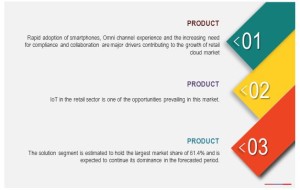Cloud computing is on-demand, internet-based computing. In the retail cloud environment, retail organizations and retailers can move their business applications and infrastructure resources to the different service architectures of cloud such as Software as a Service (SaaS), Platform as a Service (PaaS), and Infrastructure as a Service (IaaS) to gain advantage in terms of speed and agility.
The Retail Cloud market size is estimated to grow from USD 11.06 Billion in 2016 to USD 28.53 Billion by 2021, at a Compound Annual Growth Rate (CAGR) of 20.9%.
So here are the Major factors responsible for the Growth of Retail Cloud Market :
Rise in adoption of smartphones:
1. Smartphones have witnessed tremendous growth in the past decade. There were more than 2 billion smartphone subscriptions around the world in 2016, owing to declining cost, improved standard of living, and internet ubiquity.
 2. The rising acceptance of smartphones has led to a variety of new smartphone applications. Retailers are able to target customers through various mobile applications for online shopping and payments. A mobile app is more than just a convenient platform to purchase something; it should provide a personalized experience that relates both to the consumer’s interests and conveys details about items on the physical retail shelf.
2. The rising acceptance of smartphones has led to a variety of new smartphone applications. Retailers are able to target customers through various mobile applications for online shopping and payments. A mobile app is more than just a convenient platform to purchase something; it should provide a personalized experience that relates both to the consumer’s interests and conveys details about items on the physical retail shelf.
3. Mobile applications can be used for various purposes, such as providing Stock Keeping Unit (SKU) information, related products, price, and location within the retail store on the basis of data available on consumer previous shopping patterns. Mobile applications can also enable self-checkouts by communicating with the store’s payment systems to facilitate the payment process. Moreover, they can enable mapping of shopping behavior, preferences, and drive targeted promotions by using numerous data mining algorithms and big data technologies.
Cloud computing in the retail industry enables real-time access to all operational and financial data across businesses, improving effectiveness, reducing expenses, and enabling better business decisions.
The key areas where cloud computing is influencing the retail industry are channel operations, merchandising and marketing, supply chain, and sales and support.
Read More about Latest Innovations in Retail Cloud Market here – https://www.marketsandmarkets.com/Market-Reports/retail-cloud-market-27978752.html
Supply Chain Management :
1. Supply chain management is the process of coordinating & integrating the supply of materials, information, and finances from manufacturer to end-consumer, along with intermediaries, such as supplier, wholesaler & retailers, as and when required.
2. As customers are expecting better services day-by-day, the demand for enhanced cloud supply chain solutions is also increasing. It can benefit retailers in many ways, such as improving cost efficiency, increasing data accuracy, reducing operational issues, increasing customer satisfaction, and providing diverse range of product mix.
3. Moreover, it is essential for the smooth delivery of retail operations and customer satisfaction. Moreover, the need for the right product, at the right time, and at the right place is very essential for retailers to survive in the market, which can be easily managed by implementing better cloud supply chain solutions.
Merchandising:
1. Merchandising can be simply defined as any activity that leads to the sale of the product or solution to retail consumers.
2. The cloud enables enterprises to implement merchandise solutions, due to benefits such as analytics & insights into huge data sets, synchronization of online & offline data, improving operational agility, and improving security. These benefits enable retailers to implement cloud-based merchandising solutions and leverage it for enhanced category management, promotion planning, assortment & space planning, and merchandise analytics.